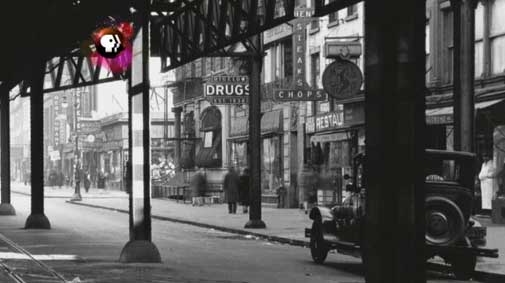
History is complicated. No one has done more to bring "serious" history to television than Ken Burns. In his latest nonfiction miniseries,
Prohibition,he and co-producers Lynn Novick and Sarah Botstein again marshal a small army of academics, writers, and researchers (photo and text) to explore a key epoch in US history -- the nation's nearly 14-year-long experiment in outlawing booze.
With the luxury of six hours of screen time, do these serious devotees of history do the topic reasonable justice? Or is the screen in some ways fundamentally antithetical to the portrayal of the history's contexts, complexities, and contingencies? The short answer is: yes. In some ways this is an impossible mission -- but the series still succeeds admirably within those limits...
Now for the somewhat longer answer.
Visually, it is hard to imagine other documentarians improving on the historical footage assembled here (for details, see my TVWW colleague Eric Gould's companion piece HERE), or editing it more seamlessly and smartly.
Too, talking heads are used to good effect, from gray eminences William Leuchtenburg, Geoffrey C. Ward, and Martin Marty to younger hands, none more refreshingly engaged and insightful than Catherine Gilbert Murdock. The periodic color intercuts of mixed drinks during voiceovers were, for me, the only production missteps in this series, which is televised Sunday through Tuesday at 8 p.m. ET on PBS (check local listings).
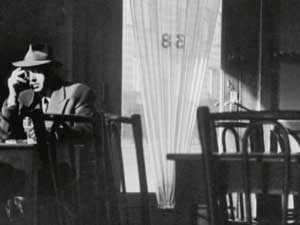
As writers of trade (i.e. popular) history books will testify, telescoping from broad canvas to mid-level episode to richly-figured individual story is a fine way to hold the reader's interest while setting colorful narratives, facts, and anecdotes in their proper context. It is hard to do, and this series does it brilliantly.
What, then, about those ever-pesky complications of history? On this score, the series does a superb job in the first part, and scores well above average in the second and third installments. The reason for the fall-off, I suspect, is that as the story moves onto more familiar territory, the series creators found it increasingly difficult to lean against received "wisdom" about Prohibition, some of it misguided.
The brilliance of part one -- "A Nation of Drunkards" -- is that it all takes place before the passage of the Volstead Act in 1919. Good history always begins before the beginning, and the importance of doing so with this episode -- the only time in U.S. history when the Constitution was amended to restrict rather than expand the freedoms of citizens, and the only time an amendment has been repealed -- cannot be overstated.
What is especially tricky about the story is that the temperance movement had very deep roots, and was interwoven with several other leading 19th-century reform movements, including anti-slavery, anti-immigration, and the women's movement. Prohibition explores those vital connections.
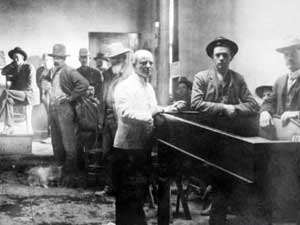
It also lays out the centrality of taverns in the after-hours culture of working-class men -- as places not only to drink and socialize, but also to bank, vote, join a union, christen a child, or attend a wake. As chummy as this sounds, drunkenness emerged early (long before nationhood) as a major scourge on American life, cutting a vast wasteland of lost jobs, battered wives, abandoned children, and premature death. Whether or not Americans were poorer at holding our liquor, we have out-consumed other "modern" nations per capita by a long shot, so to speak.
Given this long troubled history, why did prohibition come when it did, not sooner or later? And given America's deep-rooted anti-statism, why did it come at all?
Part 1 succeeds with these questions by setting longer currents of change -- 19th-century reform, changing gender roles, the spread of capitalism -- alongside a series of specific precipitating events. The Anti-Saloon League, for instance, borrowed its organizational structure from giant corporations that were becoming commonplace. The flood of "new" immigrants was increasingly associated in rural America with drinking and other forms of urban vice and decay. In World War I, all things German -- including most American-based brewers -- were tarred as unpatriotic. As 1920 approached, rural politicians feared losing power through Congressional reapportionment, and pushed hard to pass prohibition.
Many viewers probably will be surprised to learn that by the time prohibition became national law, liquor already had been outlawed in half the country on the state and local levels, and that the federal government was earning as much as 70 percent of its tax revenues from the sale of booze.
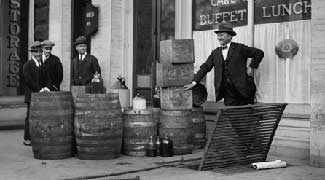
Part 2, "A Nation of Scofflaws," shows "wets" at their creative best in evading both the spirit (sorry) and the letter of the law, whether through millions of new prescription "medicines" or the well-known homemade stills and speakeasies. The centerpiece of this episode is the colossal failure of enforcement -- because many officers at all levels, like most Americans, were ambivalent about the law, and because government resources were meager.
With the feds initially assigning a mere 1,500 agents for the whole country, the outcome was pretty much foreordained. Still, drinking declined for a while, thanks to millions of real and aspiring teetotalers.
Make no mistake, for all its facility with multiple perspectives, Prohibition has an editorial viewpoint: Prohibition was a bad idea. This is ushered in by Part 2 and underscored by Part 3, where organized crime steps into the enforcement void with unchecked violence (especially in Al Capone's Chicago). Speakeasies dot the land, even serving women as a site of "liberation" by breaking the gender barrier in watering holes.
Whereas women had been a driving force for prohibition, now millions take the other side, led by wealthy New York socialite Pauline Sabin. We never learn why Sabin founds the leading women's anti-Prohibition organization, other than that she liked to throw really great parties at her Long Island mansion. Capone aside, Part 3 is thoroughly New York-centric. This makes for good film, but after Part 1 we never get a sense of how Prohibition was playing out in rural areas, the West, or the South.
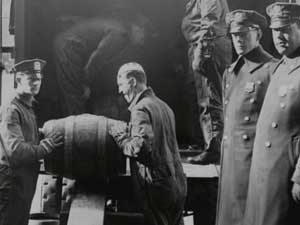
As with its treatment of Al Capone's empire, Prohibition reverts to well-worn interpretations of Al Smith's defeat in his 1928 bid for the presidency. True, he was a Catholic and a "wet," but he was also a champion of workingmen and urban reform, major dimensions of the contest not mentioned. Nor does the series do so well with the end of Prohibition. To be sure, the onset of the Great Depression brought a need for new jobs (before Prohibition, brewing and distilling had been the nation's fifth largest legitimate industry), but to this is added the point that governments no longer wanted to spend heavily on enforcement. Yet Part 1 already had emphasized how little local, state, and federal governments were spending on enforcement.
Then comes the wind-up: Alcoholism remains a social plague, but Americans, and their government, do poorly when trying to "legislating morality." I'm not sure that's what was legislated. I prefer some of the insights offered by historian Catherine Murdock, and others along the way, such as: If the prohibitionists had been willing to compromise, some of the saner aspects of their bold experiment might have held.
To its credit, Prohibition opens up a host of questions much bigger than the final bowtie on the package can possibly contain.